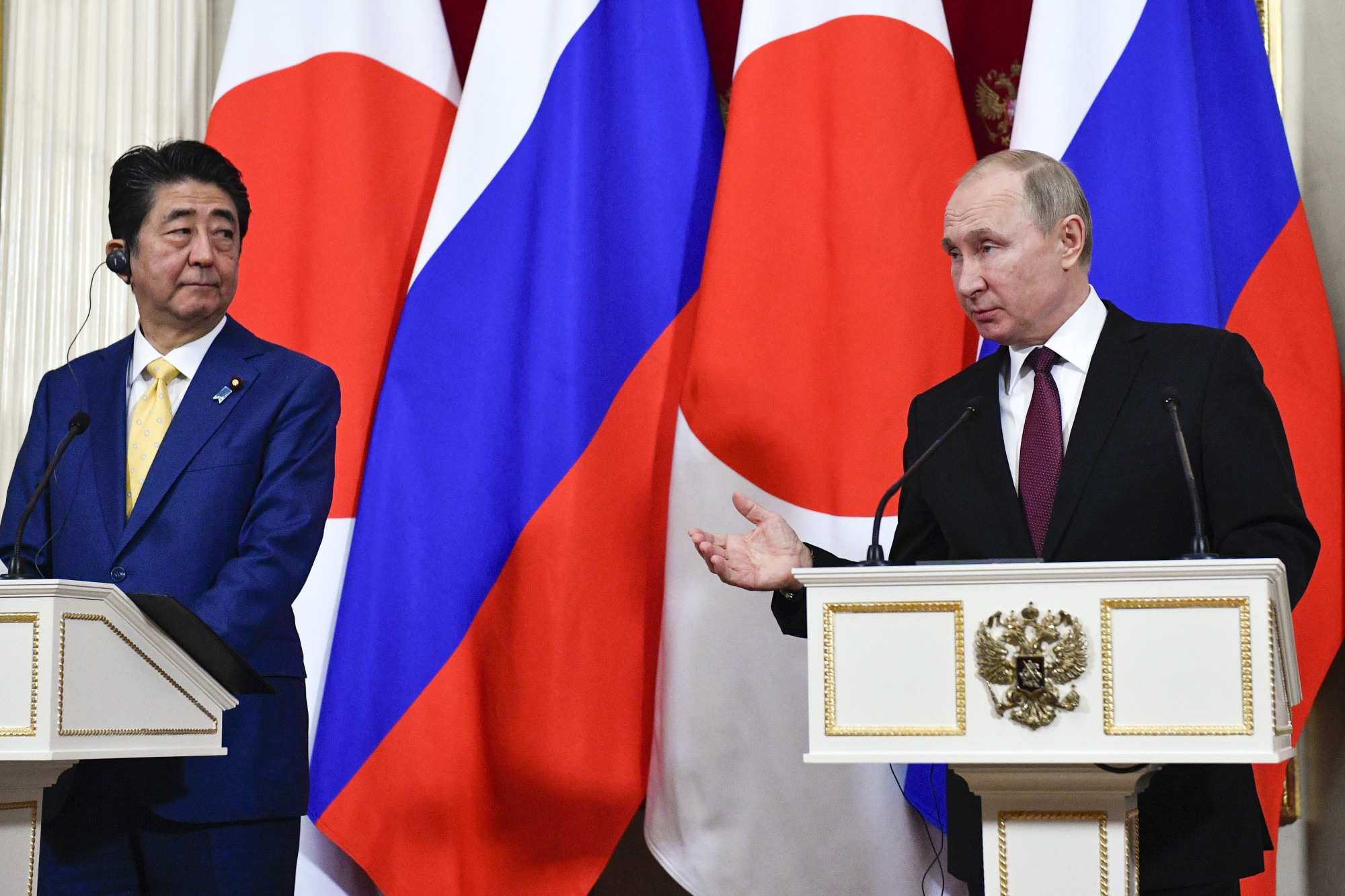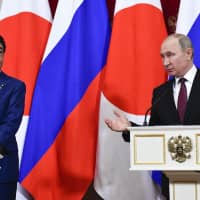On March 5, Senior Deputy Foreign Minister Takeo Mori and his counterpart, Igor Morgulov, met in Moscow to continue peace treaty talks between Russia and Japan, thereby raising the prospects of ending the abnormal state of relations that has existed since the Soviet Union declared war on Japan in August 1945. This was the second such meeting since a new framework for talks was agreed between Prime Minister Shinzo Abe and President Vladimir Putin at the end of 2018.
Little has been made public about the details of the discussions, yet it is widely reported in the Japanese media that Abe is aiming to conclude an outline agreement when Putin visits Japan for the Group of 20 summit in June. What would such a peace agreement include and can it be delivered?
The first priority for the Japanese side is that the document addresses the countries' dispute over the Northern Territories, which are known in Russia as the Southern Kurils. It is these disputed islands that have prevented the conclusion of a peace treaty due to Japan's refusal to sign an agreement until the status of the territory is resolved. As Abe told the Diet on Feb. 11, the demarcation of the border is therefore an essential part of any deal.
Traditionally, Japan has called for the return of all four disputed islands, yet this changed last November when Abe and Putin agreed to accelerate peace treaty talks on the basis of the 1956 joint declaration. This document promises that Moscow will transfer Habomai and Shikotan to Japan after the conclusion of a peace treaty. It says nothing, however, about the much larger islands of Etorofu and Kunashiri. The November agreement thereby shows that Abe is willing to settle for a two-island deal, even though this would only deliver 7 percent of the total disputed landmass.
The envisioned peace treaty would therefore recognize Russian sovereignty over Etorofu and Kunashiri, and Japanese sovereignty over Habomai and Shikotan. This represents a major concession by Abe, yet, as noted by Kremlin press secretary Dmitry Peskov in November, even after the conclusion of the peace treaty there would be nothing automatic about the transfer of the two islands. Instead, a process will be needed to determine how and when the transfer would take place. This is particularly important in the case of Shikotan, which has a Russian population of more than 3,000.
The approach that the Abe administration appears to have in mind could be described as Kawana-2. The original Kawana proposal was made by Prime Minister Ryutaro Hashimoto to Russian President Boris Yeltsin at the Kawana summit in April 1998. This suggested that the border be demarcated to assign the islands to Japan, but that Russia be allowed to continue administering the territory for a determinate period of time. This would permit a smooth transition and prevent sudden disruption to the lives of the Russian islanders.
The difference is that the original Kawana proposal envisaged sovereignty over all four islands being assigned to Japan, whereas Kawana-2 would see only Japan's rights to Shikotan and Habomai being recognized. This is a measure of the extent to which Japan's position has weakened during the two decades since 1998.
Besides the territorial dispute, the proposed peace treaty can be anticipated to address broader aspects of the bilateral relationship, including security issues. There is no need to end the state of war since this ceased with the entry into force of the 1956 joint declaration. Instead, the peace treaty could be expected to focus on expressions of friendship and mutual nonaggression.
Specifically, Kyodo reported in January that Japan and Russia are discussing a potential peace treaty clause that would commit the sides not to engage in hostile military action against each other. This is intended to assuage Moscow's concerns that Japan could assist its U.S. ally in taking aggressive action against Russia. The Asahi Shimbun also claimed in November that Abe had promised Putin that no U.S. bases would be permitted on any transferred territory.
Abe appears to have assumed that the inclusion of this reassuring language and his willingness to settle for just two islands would be sufficient to achieve a breakthrough. In reality, however, there remain serious obstacles to a peace treaty.
First, as Japan's position has softened, Russia's position has hardened. Most fundamentally, Foreign Minister Sergei Lavrov has begun to repeatedly demand that, as a first step, Japan must recognize the results of World War II, including Russian sovereignty over all of the disputed islands.
In February, Sergei Ivanov, a special representative to Putin, also visited Shikotan, where he dismissed the suggestion that Russia was considering transferring the island, stating that, "in fact, there is nothing behind it, it's all virtual." These are not the actions of a government that is preparing to cede territory.
What is more, even if Abe were able to strike a deal with Russia, he could find himself facing a domestic backlash. This is because the Japanese leadership has not sufficiently explained its shift in strategy. Indeed, the Abe government has simply stopped talking about the return of four islands and now conscientiously avoids speaking of the islands as "inherent territory" under "illegal occupation." When challenged about this by members of the opposition and journalists, government ministers avoid answering by claiming that they cannot discuss the details of ongoing talks.
Given the government's secrecy, it is not surprising that the Japanese public has not been won over. Indeed, a Nikkei survey in January found that only 11 percent of respondents were willing to settle for just two islands. This figure would likely be even lower if respondents realized that, under the Kawana-2 concept, even Shikotan and Habomai might not be transferred to Japanese control for a decade or more.
In these circumstances, it is far from certain that the Diet would agree to ratify the peace treaty. Moreover, Abe's chances of securing ratification will surely diminish as he moves closer to the end of his prime ministership in 2021 and his political power steadily drains away.
Overall, Abe has made relations with Russia a priority and he evidently remains committed to fulfilling his pledge to resolve the territorial and peace treaty issues before the end of his time in office. However, as the details of the proposed peace treaty begin to become clear, it is apparent that his government risks negotiating an agreement that only the prime minister himself and those closest to him are willing to accept.
James D. J. Brown is an associate professor of political science at Temple University, Japan Campus. © 2019, The Diplomat; distributed by Tribune Content Agency, LLC




















With your current subscription plan you can comment on stories. However, before writing your first comment, please create a display name in the Profile section of your subscriber account page.